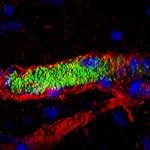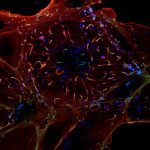Microbes frequently proliferate within complex space-limited environments, where they experience and adapt to mechanical forces to survive and proliferate. This occurs to many bacterial species during biofilm formation and inside specific niches during infection, however the mechanisms involved remain poorly understood. In the case of meningococcal infection, bacterial proliferation within the limited luminal space of blood vessels leads to the formation of dense colonies, blood flow drop and severe pathologies such as septic shock. We hypothesize that in these conditions, mechanical constraints sensed by bacteria might explain the pathophysiological features of the disease, in particular vascular damage and the emergence of antibiotic resistance.
We are looking for a talented researcher willing to investigate how bacteria sense and adapt to mechanical cues and their physiological impact on bacterial communities. To address this, we have designed the bacterial confiner in tight collaboration with the lab headed by Morgan Delarue (Cells under pressure, LAAS, Toulouse), a microfluidic chamber to monitor bacterial growth in a controlled mechano-chemical environment. This device has been validated on numerous bacterial species with varying shapes and envelopes, including pathogens. Thanks to the combination of last generation Spinning-Disk microscopy and advanced image analysis tools (Ershov et al, Nat Methods, 2022), we are now able to dynamically observe the impact of confinement on the morphology of different bacterial components and gene transcription using GFP-fusion reporters. Recent work on the biofilm-forming model organism Escherichia coli, allowed us to identify novel molecular pathways triggered upon confinement to allow adaptation under mechanical constraints, with potential implications in antibiotic response and infection outcome (Le Blanc et al, in preparation). Extension of this interdisciplinary approach to other bacteria including pathogens will provide novel insights on the key parameters dictating mechanical resilience, bacterial physiology and stress adaptation from the single cell to the multicellular scale.
For more informations, check the attached PDF document [embeddoc url=”https://research.pasteur.fr/wp-content/uploads/2023/05/research_pasteur-phdpostdoc-position-impact-of-mechanical-confinement-on-bacterial-physiology-and-antibiotic-sensitivity-upiv-call-bacterial-confiner-2023-final.pdf” download=”all” viewer=”google”]



